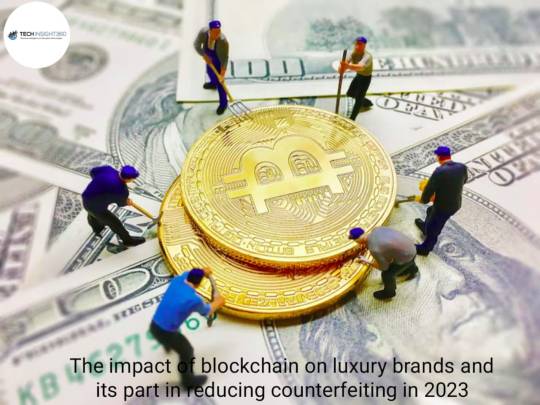#metaversemarketforecasts
Text
The impact of blockchain on luxury brands and its part in reducing counterfeiting in 2023

In the last decade, blockchain technology has grown into prominence as adoption has increased significantly. The technology has found its way into several different sectors, including payments, agriculture, and healthcare, among others. The retail luxury sector is another industry that is using blockchain technology to improve its offerings to customers.
In addition to this, luxury retail brands are also seeking to utilize the technology for reducing counterfeiting, which is causing billions of dollars in losses for businesses in the sector. Although retail brands cannot stop the production and sale of replicas, they can use blockchain technology to make it easier for genuine luxury buyers to validate their purchases. Consequently, the adoption of blockchain technology is expected to grow significantly over the next few years, as more and more retail luxury brands seek to enhance the buying experience of their customers.
In 2021, prominent luxury brands such as LVMH, OTB, Prada Group, Mercedes-Benz, and Richemont joined forces to establish the Aura Blockchain Consortium. The consortium aims to combat the issue of counterfeiting and deliver an enhanced buying experience for luxury shoppers.
In addition to this, the consortium was also developed to promote the usage of blockchain among luxury brands for authentication processes, supply chain transparency, and facilitating ownership transfers among luxury products. Since the founding of the Aura Blockchain Consortium in 2021, 20 million units have been ingested on the blockchain.
The authenticity use case offered by blockchain technology is a goldmine for luxury retail brands. As a result, many brands including the Swiss watchmaker H. Moser & Cie are joining the consortium. Loro Piana, the Italian clothing brand, is one of the most recent ones to join the consortium in March 2023. The firm is seeking to use blockchain technology for enhancing the traceability of its products from the supply chain through different phases of ownership.
Read More - Tech giants ramping up investments and trumpeting innovations to lead the AI race in 2023
Read More - Beauty brands exploring innovative ways to enhance customer engagements in 2023
Read More - Global tech giants intensify efforts to gain market share in metaverse - surge in tie-ups with blockchain companies
Ownership of the product is one of the critical elements for luxury brands, as high-quality goods are often created with the expectation that they might be passed from one generation to another.
The blockchain tool offered by Loro Piana offers customers a QR code. This QR code is used for tracing the production journey of the product through the supply chain. Furthermore, it also provides customers with a certificate, which uses blockchain to transfer ownership.
Vacheron Constantin, the high-end watchmaker, uses the blockchain solution Arianee for registering the watches and providing customers with a digital passport. This digital passport can be transferred between owners. Blockchain technology also enables investors to insure their product, declare it lost or stolen, and share or prove the ownership.
LV Diamonds, another luxury brand incorporating the use of blockchain, also provides customers with an encrypted digital file. The file maintains different records including the weight, color, purity, and cut quality. As the information is stored using blockchain technology, the brand ensures a reliable, safe, and efficient data transfer process.
The Aura Blockchain consortium seeks to use blockchain technology in such different ways, and as a result, is aiming to raise the standard of luxury brands. The use of blockchain technology by these retail luxury brands also provides peace of mind to shoppers, who are often worried about the authenticity of their products.
#metaversemarketsize#globalmetaversemarketresearch#asiapacificartificialintelligencemarketresearch#metaverseindustry#metaversemarkettrends#metaversemarketforecasts#globalmetaversemarketreports#usblockchainmarketsize#blockchainmarketsize
1 note
·
View note